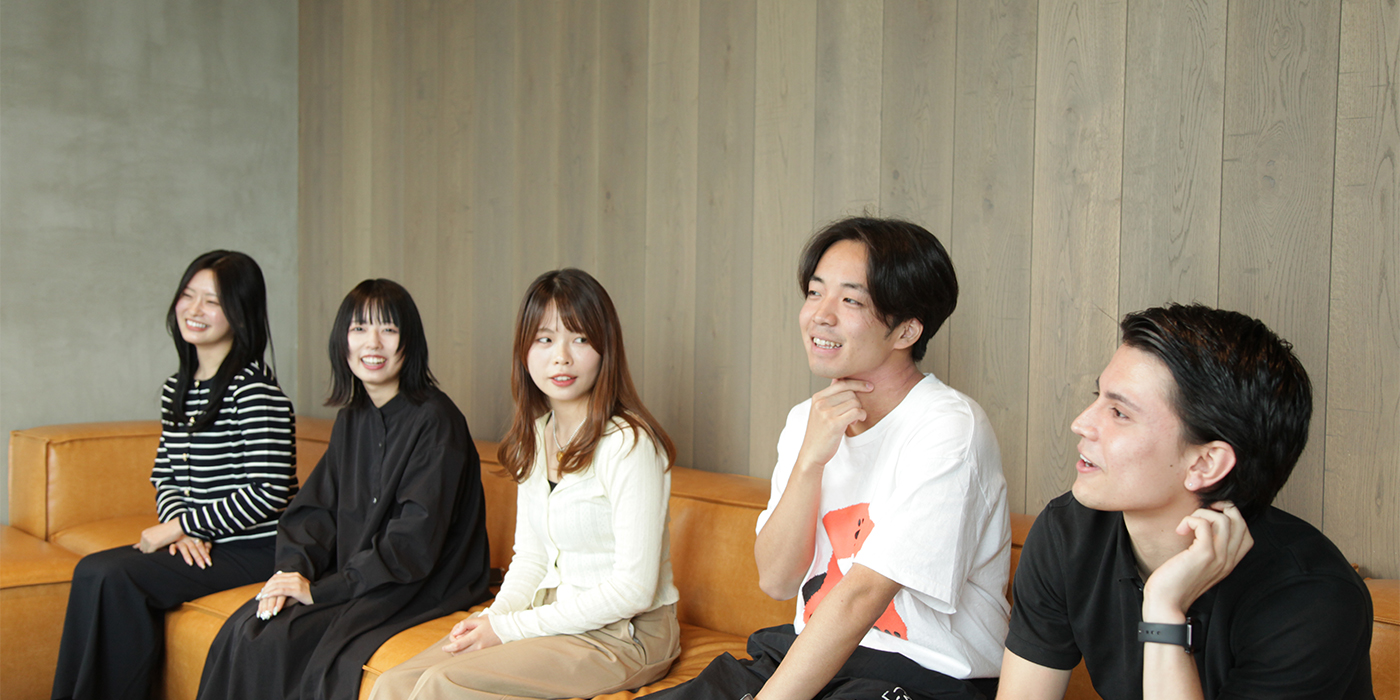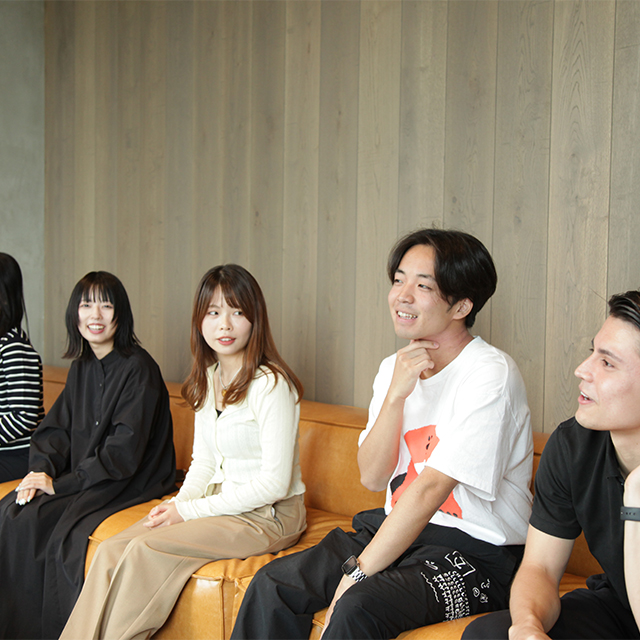The year 2024 marks the first time the company has welcomed new employees since overcoming the challenges of the turbulent COVID-19 pandemic, a period during which the entertainment industry was forced to make various adaptations. What challenges and hopes do these employees, members of the neo-digital native generation who spent their student years amidst a vastly evolving social environment, see for the future of entertainment?
We invited five new employees to discuss their honest opinions about the present and future of the industry.

(From left)Neneka Yokose /Aya Ohsawa/Satomi Kaneko/Harumichi Kitaoka/Leo Noel Shigeno
Delivering Entertainment is
not Only About Efficiency
As a starting point, we asked the five employees why they chose to enter the entertainment industry and how they felt about their work after a few months with the company.
Kaneko "I wanted to challenge myself in something I am truly interested in. Since I have a passion for music and did not want to regret my first job hunting, I decided to jump into this industry. I am now responsible for promoting artists, primarily for radio and magazine media."
Kitaoka "I am similar. I wanted to turn what I love into my career. But people around me often warned that “I might end up hating what I love if I make it my job.” Right now, I am working to discover and nurture new talent while also supporting our current artists. Since started working, I have realized the importance of building relationships with people; it feels more like a team sport than an individual one. And so far, I have not hating my favorite music, even after started working haha!"

Ohsawa "Up until high school, I wanted to work outside the entertainment industry. But during the pandemic, while spending time watching anime and listening to music, I realized how comforting it was to be entertained even when I felt down. So, I began searching for a career where I could help others feel that same satisfaction. Although my role involves ticket sales, I have many opportunities to interact with people outside of the company, like ticket box offices and local promoters. Through this, I also truly feel the significance of connecting with people in this job."
Yokose "I love going to live concerts and have been going since I was in primary school, spending most of my part-time job earnings during my student days on them. Since I was little, I have admired this industry, seeing it as full of dreams, so entering it felt natural to me. Now, I am responsible for discovering and nurturing young talents at avex Youth, where I support children in pursuing their dreams."
Shigeno "What made me decide to enter this industry was being moved by the movie “The Wind Rises” and becoming interested in the role of a producer. I work in the animation department, which produces and sells video packages. But often, many companies collaborate as one production committee to bring a single anime to life. If you trace each work back, there is an original author, and the anime is born from that person’s vision. So, it is important to treat each project with respect, and I am beginning to see the rewards in that."

Moved by music and animated films, these formative experiences became their pivotal points in shaping the career paths of these five individuals. So, what are their thoughts on the current issues facing the entertainment industry?
Kitaoka "I feel that the speed of content consumption is increasing. From the days when we all gathered around the television to watch the same show, we are now in an era where entertainment is received individually. There are so much interesting contents being created from various platforms, which accelerates consumption. This makes me wonder what we can do to make the most of it."
Shigeno "These days, the number of films that are easy-to-understand is increasing, and I think that contributes to the faster rate of consumption. But there are also films that take time to fully grasp. Even today, there is still that culture where people go online to read other people’s interpretations after watching films. When a film is truly moving, it does not matter whether it is easy to understand or not. As someone on the creator’s side, I understand that feeling and want to create films that offer more than just instant “digestibility” as their appeal."
Ohsawa "I also sense the increased rate of content consumption, but also a certain shallowness. For example, there is an artist who is in high demand at music festivals, but when it comes to solo tours, the ticket sales do not soar. I feel that is very surface-level consumption. It is disappointing to think that audiences feel satisfied just by seeing the artist briefly at a festival. Personally, as someone who enjoys supporting an artist deeply, it is a little hard to relate, but I recognize that people enjoy entertainment in different ways."
Yokose "In the process of discovering new talents, I have chances to interview the people who we scout. When I ask them about artists they admire, they frequently reply that they “do not have one.” When I ask them why, most explain that they are “not very familiar with music since they only listen to it through social media platforms.” It is a significant issue that even those who attend the scouting interview do not know what kind of music they like."
It is certainly a challenge to provide high-quality content that brings deep satisfaction in response to the rapid pace of consumption. However, the new employees are focused on delivering entertainment that is both “wider and deeper.” To achieve this, they believe it is not enough to simply have consumers receive conten but it is also crucial to inspire changes in consumer behavior.
Going Beyond Algorithms and
Delivering Diverse Entertainment
To create a new era that consumes not only easy-to-understand content that maximizes time efficiency and high satisfaction but also delivers content that is “deeper and wider,” what efforts should we focus on now?

Shigeno "I think that there is nothing but to challenge. We can only keep on creating content that “sticks out” and is “new.” If we talk about anime, for example, all the studios are competing to create animations from this genre called “Isekai” right now. Although, on one hand, I think it is correct to make a profit from them when they are trending, as long as we are creating Isekai genre content, there will not be anything new coming out of it, so I also think we will not be able to break through the status quo."
Kitaoka "I believe that sometimes, people can feel strongly attracted to unique and distinctive content. For example, in music, I am sure that you can relate to a song that did not click so much when you first heard it, but it grows on you as you get more familiar with the sound. That may not mean that it is easy-to-understand content, but I think it might be interesting to create that sort of entertainment on purpose."
Alternatively, there were some opinions regarding how they felt a sense of crisis in the state that these days, the recommendation function on music platforms disrupts the spreading of various music to curious music listeners.
Ohsawa "Since there is diverse music content and an immense number of artists, I think it is difficult to find the music you truly love. And then while you are in that lost state, the platform's algorithms recommend you music like, “You like this, don't you?” Then it is way more convenient and easier to just listen to those. As a result, there will be more people who only listen to specific music genres, which, in a way, I think is inevitable. Although it may be efficient to be able to find what you want among the vast music genres that exist, that may mean that you are limited in your options due to the algorithm."

There are likely many people who believe that the music they “like” is simply what they listen to because it is recommended on social media. Many might even feel a sense of loss, realizing they that they have missed the opportunity to discover new music tastes.
Kaneko "I strongly feel it would be wonderful if we could create an environment where everyone can find new things they like, things they did not even know existed."
Kitaoka "I think creators need to be aware that, for many people, what they see on their social media feeds represents everything."
For these new employees, who hope that people can “encounter more things they truly love,” the current situation feels as if music listeners are trapped within the algorithm. To overcome this barrier and offer a wider range of attractive content, what actions can we take now?
Kaneko "It might be interesting to have two artists from completely different genres collaborate. That could help broaden listeners’ musical perspectives, where someone who likes idol music might explore band music, and vice versa."
Yokose "When nurturing new talent, we often say that if you want to become a Korean idol group, it is not enough to just listen to K-pop. It is important to recognize that the roots of K-pop music actually lie in hip-hop, R&B, and dance music. To perform attractively, you need to delve deep into these musical backgrounds. There is so much to gain from exploring multiple genres rather than being confined to just one. For instance, it is meaningful when an influential artist releases a song that connects to their roots or even a song outside their usual genre. I think that opens doors to future possibilities for the next generation."

It may be the responsibility of both staff and future artists to deliver content that not only aligns with the fans’ expectations but is also something unexpected, something that would expand the musical perspectives of the audience.
On the contrary, there are also these views:
Shigeno "I think it is harder to produce a national hit artist nowadays because entertainment has shifted from something we all watched together on television to a more personalized experience. When I think about what I can do with the algorithm, it simply comes down to doing what I want to do. If we keep trying to mass-produce content based on what customers wants to see, it is hard to predict the outcome. So I would rather focus on what I am genuinely drawn to. It may not result in big sales, but I hope it will find success somewhere. I think it is crucial to aim to be that initial person who makes an impact, even within a small niche."
Kitaoka "I also believe it is essential to stay committed. If the targeted audience really enjoys the content, it can influence those around them and potentially spread in popularity. By first focusing accurately on the target audience, the appeal can then naturally broaden to other consumers."
Ohsawa "Another way is to create many small contents that go viral, offering a variety of buzz to different groups. It might not create a single massive impact, but like generating small profits, it is also important to keep creating a steady buzz that resonates with different circles."
As entertainment consumption evolves, it has become vital to make content appealing on a “wider” scale, and at the same time, help people engage “deeply” so that they can truly like it. Though their approaches vary, what may drive the success of such a mission is the passion they feel for the content they create and deliver. It is starting to become clear that this kind of enthusiasm might be the key to success.
What I Can Do For the Future of the
Entertainment Industry
Lastly, we asked the new employees to share their visions for the future of the entertainment industry and themselves.
Kitaoka said, "I want to produce music that will last forever. Although today we discussed various platforms and the accelerating pace of consumption, I still get really excited when I come across old, cool music after many years. I strongly want to create music like that, too. While aiming to go viral is important, I want to create music with artists in mind, envisioning that they will continue as artists even if our paths diverge in the future."
Shigeno "I want to keep challenging myself as a producer, creating the video content I am passionate about by pitching new projects. By aligning my abilities with what is happening in the world, I aim to produce something that can only be created in that era. I hope to continue embracing interesting challenges that are unique to each moment."
Ohsawa "Since I am on the distribution side more than the creative side, I hope to keep working in that role. Ticket sales put you really close to the customers; you get to interact with people who come to the venue with tickets that we provided. I want to channel that satisfaction and joy into my work and contribute in my own steady way."
Yokose "As we talked about diverse entertainment content, I want to do my best to help the talents we discover achieve great things. I want to spend time training with the children at avex Youth and definitely experience that glorious success together."
Kaneko "I want to create an environment where everyone who loves music, including artists and listeners, can feel constantly excited. I hope to discover things that make people say, "Wow, I did not know this was possible!" and make it enjoyable for myself, the artists, and the listeners. And it would be even better if that also brought profits to the company. I want to be that kind of intermediary."

These new employees of 2024 grew up in an era where social media was always within their reach, spending their student years amid the major social shifts of the COVID-19 pandemic.
The insights of the neo-digital natives were sharp and showed a deep understanding of the entertainment business. What kind of future do they envision, equipped as they are with a dual perspective of both consumer and creator, and with a unique grasp of the latest media technology and authentic value? We shall look forward to the successes this generation of employees will bring.

(Photo from left)
Avex Entertainment Inc.
Neneka Yokose
Avex Live Creative Inc.
Aya Ohsawa
Avex Music Creative Inc.
Satomi Kaneko
Avex Music Creative Inc.
Harumichi Kitaoka
Avex Pictures Inc.
Leo Noel Shigeno









